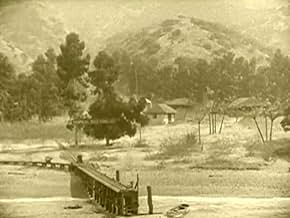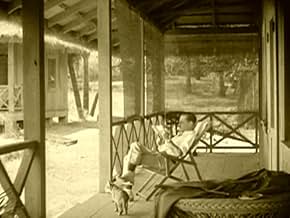Adicionar um enredo no seu idiomaAxel Heyst, an uncommitted wanderer, has settled on an island in the South Seas. He takes pity on a troubled young woman, Lena, and gives her refuge on her island. But the piratical Mr. Jone... Ler tudoAxel Heyst, an uncommitted wanderer, has settled on an island in the South Seas. He takes pity on a troubled young woman, Lena, and gives her refuge on her island. But the piratical Mr. Jones, who believes Heyst has treasure buried on his island, leads his cohorts in an invasion ... Ler tudoAxel Heyst, an uncommitted wanderer, has settled on an island in the South Seas. He takes pity on a troubled young woman, Lena, and gives her refuge on her island. But the piratical Mr. Jones, who believes Heyst has treasure buried on his island, leads his cohorts in an invasion of Heyst's haven.
- Direção
- Roteiristas
- Artistas
- Undetermined Role
- (não creditado)
- Undetermined Role
- (não creditado)
- Capt. Davidson
- (não creditado)
- Orchestra Member speaking to Alma
- (não creditado)
- Mrs. Schomberg
- (não creditado)
- Direção
- Roteiristas
- Elenco e equipe completos
- Produção, bilheteria e muito mais no IMDbPro
Avaliações em destaque
The Paramount Pictures production contained an all-star cast, likely having the most well-known actors in one movie yet in early cinema. One critic called stylist director Maurice Tourneur's expertise in the plot's presentation shared a similar cinematic style of movies made 40 years after "Victory."
Tourneur's cast makes Conrad's story all the more believable. Jack Holt puts in a very believable effort as the main protagonist of "Victory" who wants to live a quiet life alone on a deserted island. The viewer knows that'll never happen when a woman is introduced to him when he settles matters in his last trip to civilization. His solitary lifestyle, with the woman, turns into a Sam Peckinpah 'Straw Dogs'- like scenario when three interlopers plan to invade Holt's island. Wallace Berry gets the trio salivating when he makes up a story about treasure on Holt's homeland to exact revenge on the guy who took his hotel worker. Lon Chaney, as an hispanic murderer, is the most dastardly of the three robbers, a role of villain he played a number of times in his early film career.
Conrad never said how he liked his novel's adaptation onto the big screen, but the critics and audiences loved it, which proved to be another feather in the cap for director Tourneur.
This is an OK flick, although Holt is not exactly my idea of a romantic lead, and he's dull, to boot. Seena Owen, as Alma, appears frumpy in earlier scenes, until somebody had the good sense to throw her in a sarong.
Wallace Beery, as Schomberg, looks like Sig Ruman. The film really belongs to Lon Chaney, as Ricardo. He probably has as much screen time as Holt, and is more fun to watch.
Pedro is played by wrestler Bull Montana, who does get to show off his physique.
Ben Deeley, in the role of Mr. Jones, with his thin off-kilter circular sunglasses, appears to be the creepiest of the lot.
But once I focused on the plot, I was impressed on how well-constructed it was. The story moves along at a smooth, smart pace, and the tension builds very nicely. This is a pretty generic thriller in many ways, with a generic romance at the heart of it, but it's put together so effortlessly and with such visual charm that it seems fresh. Still, the real dramatic motor is the bad boys, particularly Lon Chaney as the psychopathic but strangely good-natured Ricardo and Ben Deeley as the cold, creepy Mr. Jones (looking like he stepped out of a Fritz Lang movie). There's also a good twist in the history and brute plan of Bull Montana's Pedro. Seena Owen's role is underwritten, but her weary, vulnerable resolve is beginning to grow on me.
Maybe this is where the movies start for me. Certainly it's the earliest movie to hold me entranced from stem to stern, although the German classics begin full-bore within a year of this. But there's still a lot more to see from the era.
When pre WWI isolationist Jack Holt steals a girl away from predatory hotel permitee Wallace Beery, Beery sics a trio of island-hopping fortune hunters on him. Lon Chaney steals the film as the shiv-shoving Ricardo, but Seena Owen is his equal as the desperate but clever Alma. Jack Holt is the jut-jawed hero, Bull Montana (the "ape man" of 1926's THE LOST WORLD, which starred Beery) a simian heyboy and Ben Deeley is the languid, almost Ernest Thesiger-like villain of the piece.
Jules Furthman's script simplifies Conrad's novel, and provides a much happier ending, but it's still surprisingly faithful and Conrad's witty but
fatalistic voice rings loud and clear.
The plot may sound a little absurd spelled out like that, but the film itself is surprisingly enjoyable, and its source material is more than respectable: Victory is an adaptation of a 1915 novel by no less than Joseph Conrad, and it generally follows the action of Conrad's story, aside from the Hollywood-style happy ending. This was no B-picture, it was a major release from Paramount with first-rate production values, an excellent cast, and sensitive direction from Maurice Tourneur, a top director at the peak of his career. French-born Tourneur began his career as an artist and scenic designer, and his films are marked by striking compositions that differ sharply from the prevailing flatness of so many routine movies of the time. The cinematography in Tourneur's films is always beautiful and often surprisingly sophisticated, highlighted by dynamic shots that utilize the background, foreground, and middle range of the image. For example, watch the early scene in Victory when leading man Axel Heyst (played by Jack Holt) returns to the hotel with Alma (Seena Owen) to retrieve her belongings and escape. Where other directors of the period might direct this scene as it would be done on stage, with the two characters simply entering from one side and crossing the lobby, Tourneur keeps the hotel's staircase in the left foreground as Axel & Alma enter from the right background and slowly move forward. It's night, the wind is blowing hard, and we can see tree branches rustling through the windows; Axel & Alma must creep down a corridor toward the camera, not laterally across a "stage." It's very cinematic, a composition that doesn't resemble other movies of 1919 so much as the work of Orson Welles at RKO in the early 1940s, and the many shadowy crime dramas which followed.
Still, all the innovative camera angles in the world won't carry a film if the actors aren't up to the task, and happily Victory features a number of first-rate players. The primary reason this film is remembered today (and certainly the reason it's been made available on DVD) is the presence of Lon Chaney as Ricardo, one of the trio who arrive on Axel's island to menace our hero and heroine. Chaney may not be the first actor one might think of for the part of a knife-wielding Hispanic thug, but he brings his unique charisma to the task and makes the role his own, deftly stealing the show. Today Chaney is generally pigeonholed as a horror star, but it's worth noting that he spent most of his career in roles like this one, certainly villainous but in no way touched by any element of the supernatural. Chaney threw himself into his portrayal of Ricardo with his customary energy, at times moving like a dancer and always drawing our attention in any grouping of actors.
Jack Holt is stolid and frankly not too interesting in the lead role of Axel Heyst, but in fairness the part is a thankless one, as the demands of the story force our protagonist to be little more than gentlemanly and laid-back until the climax. Seena Owen makes a stronger impression as Alma. Prior to seeing this movie I was aware of her primarily for her amazing performance as the Mad Queen in Erich Von Stroheim's notorious Queen Kelly, a role vastly different from the one she plays here. Owens' Alma is a more demure (to put it mildly!) and complex figure, and she's especially impressive in a sequence when Ricardo mauls her. Alma must fend him off while pretending to be flattered, even "turned on" by his brutish attentions, only allowing her genuine feelings to become clear after he has gone. Wallace Beery, who generally played slimy bad guys at this point in his career, sports an amusing beard and is as unpleasant as ever in the role of August Schomberg, the despicable hotel manager whose lust for Alma sets the plot in motion. Finally, I was very much taken with an unfamiliar actor named Ben Deeley, who played "Mr. Jones," the leader of the trio who invade the island. Jones is a fey, feline, and startlingly modern looking villain. For today's viewers his slicked-back white hair and dark shades suggest the star of a Euro-pop rock video of the 1980s. Deeley gives an understated performance that goes with his appearance. Over all, the acting here is remarkably low-key; the arm-waving histrionics often associated with silent drama is nowhere to be found.
In sum, Maurice Tourneur's Victory is an unexpected treat for silent film buffs, a well-made, well-acted and entertaining melodrama featuring a number of unusual touches that lift it well above the realm of the ordinary. And hey, it boasts an action finale set against the backdrop of an erupting volcano! What's not to like?
Você sabia?
- CuriosidadesThis was the only film version of one of his novels or stories that Joseph Conrad actually saw.
- ConexõesEdited into Spisok korabley (2008)
Principais escolhas
Detalhes
- Tempo de duração
- 1 h 2 min(62 min)
- Cor
- Mixagem de som
- Proporção
- 1.33 : 1




























